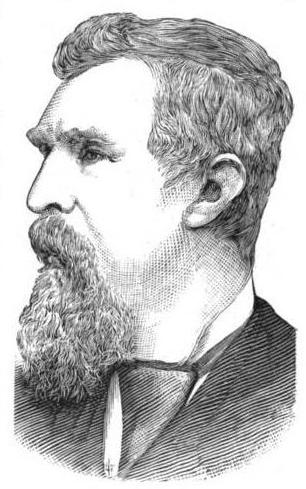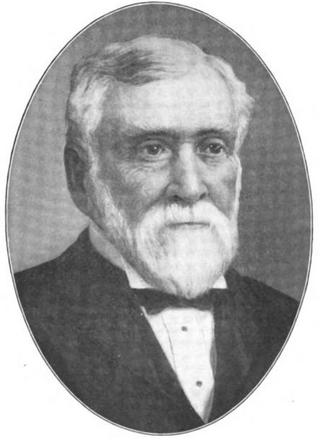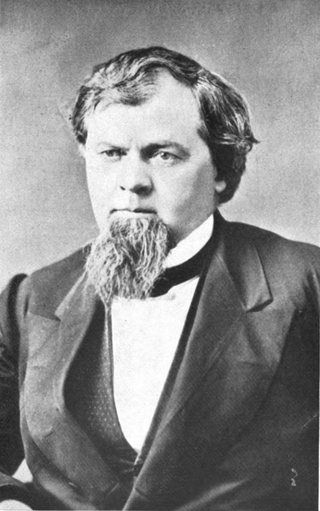Related Research Articles
The Town of Milwaukee was a town in Milwaukee County, Wisconsin, United States, created on March 17, 1835. A number of Milwaukee County municipalities, beginning with the City of Milwaukee, were created out of portions of it. After the last portions of the town were annexed, it officially ceased to exist in 1955.

Henry Smith was a millwright, architect, builder and politician who was elected a member of the United States House of Representatives from Wisconsin from 1887 - 1889 as a member of the Union Labor Party. He also served as a Socialist member of the Wisconsin State Assembly in 1878. At different times, Smith ran for office on the Socialist, Greenback, Democratic and Union Labor tickets.
Benjamin Franklin Hopkins was an American politician and telegraph operator. He was a member of the United States House of Representatives for the last three years of his life from 1867 to 1870.

Orsamus R. Cole was an American lawyer and judge. He served as the 6th Chief Justice of the Wisconsin Supreme Court, and, until 2013, was the longest-serving justice in the Court's history, with nearly 37 years on the high court. He also represented Wisconsin's 2nd congressional district in the U.S. House of Representatives for the 31st Congress (1849–1850). His name is frequently misspelled as Orasmus.

Thomas Richard Hudd was an American lawyer and Democratic politician from northeast Wisconsin. He served three years in the U.S. House of Representatives, representing Wisconsin's 5th congressional district from 1886 to 1889. He previously served 10 years in the Wisconsin Senate and two years in the State Assembly, and served various local offices.
Perley J. Shumway was an American blacksmith, farmer, pioneer and politician from Wauwatosa, Wisconsin.

George Baldwin Smith was an American lawyer and Democratic politician. He was the 4th Attorney General of Wisconsin, and the 3rd and 16th mayor of Madison, Wisconsin.
James Tinker was an American farmer from Rochester, Wisconsin who served a single one-year term as a Free Soil Party member of the Wisconsin State Assembly, in 1851, from Racine County as well as holding a variety of local offices.
Herman S. Thorp was an American farmer from Bristol or Cypress, Wisconsin, who served as a Free Soil Party member of the Wisconsin State Assembly from Racine County, and a Republican member of the Wisconsin State Senate from the 8th District.
Joseph Spaulding was an American farmer from Rock County, Wisconsin, who spent two one-year terms as a member of the Wisconsin State Assembly from Rock County, first as a Freesoiler and later as a Republican.
Charles Rankin Deniston (1835–?) was a member of the Wisconsin State Assembly in 1874 and 1875.
Hollis Latham was a Wisconsin farmer and politician.
James DeMott Condit was a member of the Wisconsin State Assembly.
Daniel Hall was Speaker of the Wisconsin State Assembly.
Matthias Theisen was an American farmer from Roxbury, Wisconsin, who served as a member of the Wisconsin State Assembly in 1879. Additionally, he chaired the town board and was Town Treasurer of Roxbury, Wisconsin. He was a Democrat.
Henry C. Bottum was a farmer, American politician and member of the Wisconsin State Assembly.
La Fayette Eastman was an American politician who served as a member of the Wisconsin State Assembly.
Archibald Nichols was a member of the Wisconsin State Assembly.
John T. Lyle Jr. was an American farmer from Montrose, Wisconsin, who served as a member of the Wisconsin State Assembly and as chairman of his town.

The 1877 Wisconsin gubernatorial election was held on November 6, 1877. Under internal party pressure, incumbent Republican Governor Harrison Ludington, who had barely won the 1875 election, was pressured to not seek a second term. Former State Assembly Speaker William E. Smith, a longtime figure in Wisconsin politics, was selected as the Republican nominee, and Milwaukee County Municipal Judge Thomas A. Mallory won a protracted battle for the nomination at the Democratic convention. Smith and Mallory were joined in the general election by Greenback nominee Edward Phelps Allis. Ultimately, though the Republican vote share shrunk relative to 1875, the Democratic vote share shrunk more, and Smith won a larger victory than Ludington did, though only with a 44% plurality.
References
- ↑ H. A. Tenney; David Atwood (1880). Memorial Record of the Fathers of Wisconsin. Madison, Wis.: David Atwood. pp. 97–100. Retrieved 2015-06-23.
- ↑ Lyman Draper (1872). "A Sketch of the Life and Services of Hon. George Heyer". Report and Collections of the State Historical Society of Wisconsin, vol. VI. Madison, Wis.: Wisconsin Historical Society. pp. 136–149. Retrieved 2015-06-23.